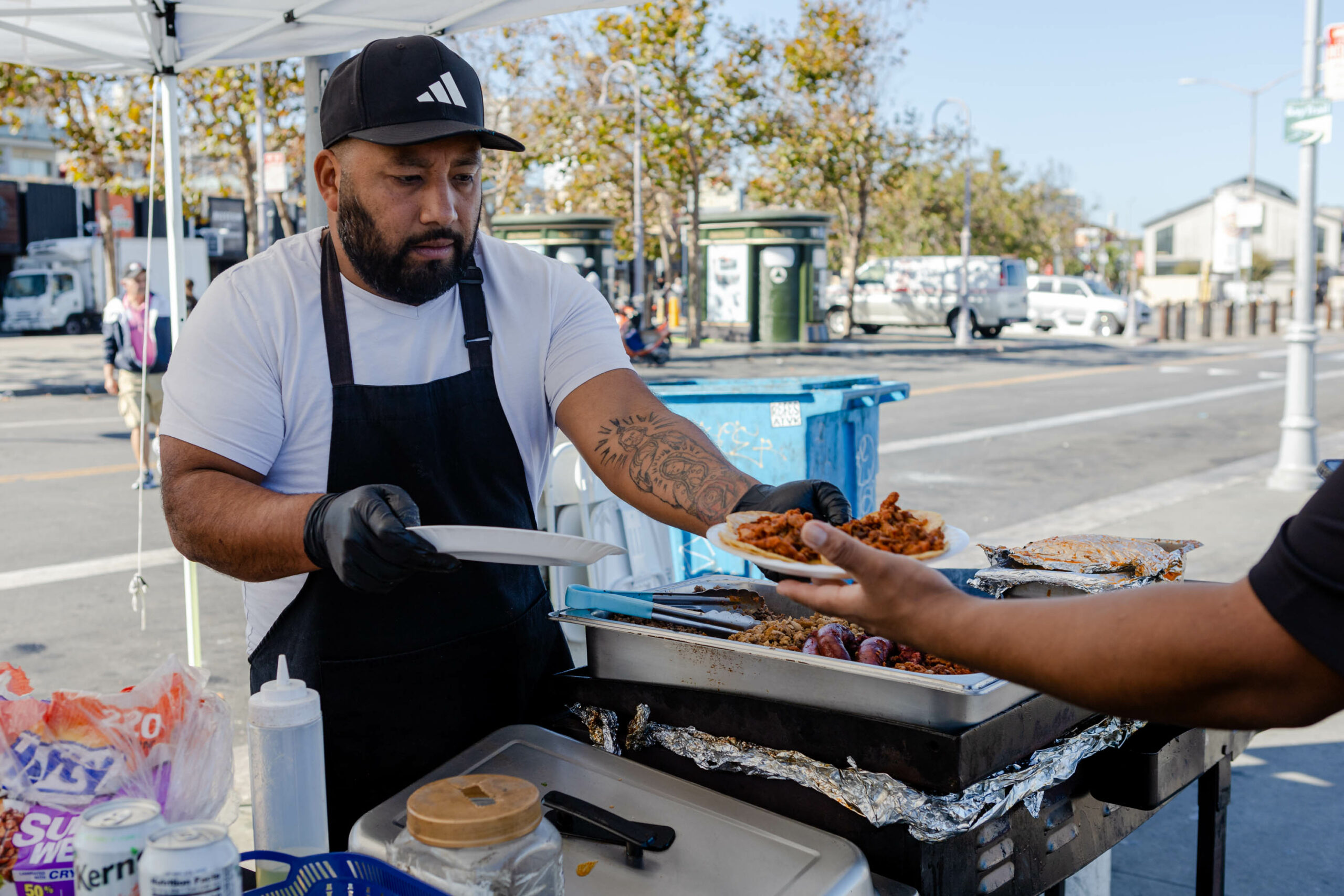Gregorio Valencia and Griselda Torres operate a street food stand on the sidewalk close to Fisherman’s Wharf, which on rare clear days offers a direct view of the iconic Alcatraz Island.
Torres stands on one side of their setup slicing up chunks of vibrant fruit dressed with lime, Tajin seasoning and Chamoy sauce. On the other end is Valencia, heating up tortillas for tacos and quesadillas filled with an assortment of meat options and homemade salsas ladled over top.
Among their customers on a recent weekday was a worker on break from Boudin’s Bakery, a family stopping for a quick bite during a morning stroll and tourists purchasing cups overflowing with an assortment of tropical fruit.
But setting up the stand is a struggle. When they unload their equipment and supplies, they’re often confronted by police officers who write them tickets with fines that go up to $200.
“We’re not doing anything wrong,” Torres said via a translator. “We want to have a permit so we won’t be bothered by the authorities for just trying to work.”
SB 972, a new state bill recently signed into law by Gov. Gavin Newsom, is meant to make it easier for street vendors to operate legally by creating a new category in the state’s retail food code that streamlines the requirements to receive approval from public health officials.
“It’s really about right-sizing these requirements, making sure they’re based on updated science and ensuring that we aren’t putting onerous restrictions around sidewalk food vendors that just shouldn’t be there,” said Lyric Kelkar, policy director for Inclusive Action for the City, a nonprofit which advocated for SB 972’s passage.
The law—which goes into effect in January—creates a new category called compact mobile food operations with equipment requirements more in line with how sidewalk vendors operate than food trucks. For example, there are loosened guidelines around the number of sinks and amount of water that vendors are required to carry. There are also public health restrictions under the law, like a requirement that raw meat be pre-cooked before being reheated by the vendor at their stand.
Kelkar positioned the new law as part of a larger legitimacy campaign that included the successful passage of SB 946 in 2018, which decriminalized street food vending across the state while allowing regulation for the protection of public health and safety. Essentially, this meant that while food vendors could be subject to administrative penalties and fines, they could not have criminal charges filed against them for vending.
San Francisco officials are responsible for figuring out how to implement SB 972 once the law goes into effect. In a statement, the Department of Public Health said it expects to receive guidance from the state on how to roll out the law locally.
But not everyone is so supportive of the new rules. Randall Scott, executive director of the Fisherman’s Wharf Community Benefit District, said the decriminalization measure served to vastly boost the number of operating vendors, particularly during the pandemic. He believes the ability for these small businesses to operate should be balanced with access to the public right-of-way and public safety.
Scott pointed to an incident in July 2021, where a small gas tank used by an unpermitted hot dog cart exploded as two customers were buying food. Soon after, the Board of Supervisors passed legislation that was meant to create a permitting scheme for vendors, including escalating fines for scofflaws.
Scott said that effort has been largely ineffective because of a lack of clear enforcement. He said he spoke to vendors who gave up trying to work in the regulated system because they saw others who flouted the rules being treated in the same manner.
In turn, Scott said busy weekends at the wharf mean a major influx in vendors that block the public walkways, leave litter behind and sell alcohol and other illicit substances.
“I have no issue with moms and pops who want to come out on the sidewalk and sling their wares as long as they follow health and safety code. But when they’re here in such a number that they basically wall off Pier 39, then that becomes a major problem,” Scott said. “I get they want to enter the formal economy. Well, the first step is following the formal laws.”
Then there’s also the issue of San Francisco’s notoriously complex bureaucracy. Business activity on the waterfront is governed by an alphabet soup of agencies, including the San Francisco Port, the Department of Public Works, the Department of Public Health and the police department. The permitting process also differs based on where a vendor would like to operate.
As a solution, Scott suggested a lottery system that could help control the number of approved vendors and stepped-up enforcement measures for rule-breakers.
For their part, Valencia and Torres said they’ve tried to get permits in the past, calling up relevant city departments. But they’ve been largely ignored or given a rote response that they can’t be provided one.
“I think the street vendors are currently taking a risk to be out and operating. It is very expensive to get the permits, and many are not even eligible at this point,” said Carolina Martinez, the CEO of CAMEO, a nonprofit that advocates for micro-enterprises.
A hot dog vendor in front of Alcatraz Landing who asked to be called “Mister Dog” after the name of his cart was visibly excited when told about the new law meant to make permitting easier. He said that while he realizes some vendors would choose not to apply for one, he personally would invest in the process in order to provide some measure of protection for his business.
“I’d be really grateful if the city provided more information in a clear and just way,” he said via a translator. “I hope they can work as fast as they can to make this a reality.”
